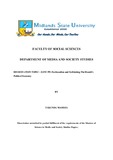Please use this identifier to cite or link to this item:
https://cris.library.msu.ac.zw//handle/11408/2978| Title: | ZANU PFs factionalism and rethinking The Herald’s political economy | Authors: | Maodza, Takunda | Keywords: | Political economy theory Media Political news Zanu PF Zimbabwe |
Issue Date: | 2017 | Publisher: | Midlands State University | Abstract: | This study rethinks the legitimacy of the political economy theory in so far as it assumes that media owners unproblematically determine content in newspapers, radio or television stations that they own. The study was stimulated by The Herald’s political news content in the period between 2015 and 2017, which scandalised some senior politicians in the Zimbabwe African National Union Patriotic Front (ZANU PF) Government. This occurred notwithstanding the fact that the ZANU PF Government has over 51% shareholding in the Zimbabwe Newspapers 1980 Private Limited and must according to the political economy theory of the media must have overseen the editorial content at The Herald. The study answers the question- how was it possible for The Herald to publish unfavourably about such Senior ZANU PF Officials, as its national political Commissar and Local Government, National Housing and Urban Development Minister Saviour Kasukuwere, Higher and Tertiary Education, Science and Technology Development Minister and Politbro Member Jonathan Moyo and the Minister of Public Service Labour and Social Welfare, who also happens to be President Robert Mugabe’s nephew, Patrick Zhuwao, among other party stalwarts. The Herald has always propagated the interest of Zanu PF and its members across the rank and file of the party but this changed since the expulsion of then Vice President Joyce Mujuru and here allies from the ruling party in 2014. The researcher is a news editor at The Herald and brings insider information on how the newspaper generated political stories on ZANU PF functionalism during the period understudy by diagonising the news production process, interviewing political reporters and through use of participant observation. This study adopts a qualitative research paradigm or what Bryman (2001) calls the interpretive approach. | URI: | http://hdl.handle.net/11408/2978 |
| Appears in Collections: | Master Of Science In Media And Society Studies Degree |
Show full item record
Page view(s)
404
checked on Feb 19, 2026
Download(s)
222
checked on Feb 19, 2026
Google ScholarTM
Check
Items in MSUIR are protected by copyright, with all rights reserved, unless otherwise indicated.




